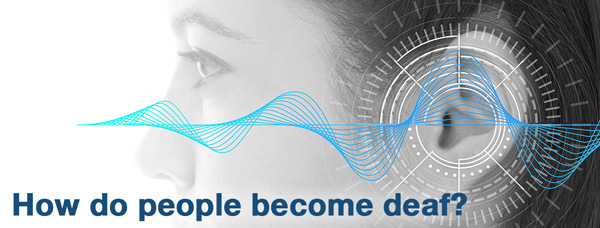
How do people become deaf?
Hearing loss may be gradual or sudden. There are several causes of deafness.
- Repeated exposure to noise: Deafness may result from repeated exposure to noise: loud music, factories, construction, etc.
- Genetics: It is relatively rare that hearing loss is inherited, but it can be.
- Rubella (German measles): Rubella is a contagious illness. It is usually a mild infection, however, complications include deafness, and the risk is especially high for babies born to mothers who had rubella while pregnant. The rubella epidemic of the mid-1960’s affected many pregnant women whose children were subsequently deaf. Now there is a rubella vaccine, usually given as a combined measles-mumps-rubella (MMR) vaccine, which prevents rubella.
- The RH factor: In addition to having a blood type (A, B, O, AB), humans have a Rh factor which is either positive or negative. A woman and her unborn baby are at risk when she is negative and her partner is positive. It’s a blood incompatibility that can lead to Rh disease. Rh disease in babies may affect their health, including causing deafness. However, Rh disease may be prevented even if the mother is Rh negative. Prenatal care now includes a blood type and Rh factor screening test during the mother’s first prenatal doctor’s visit. If Rh factor is found to be a concern, the mother can get a medicine called Rh immunoglobulin (RhoGAM) to prevent Rh disease.
- Other illnesses: Some other illnesses with complications which may cause deafness include chicken pox, cytomegalovirus, mumps, meningitis, sickle cell disease, syphilis, lyme disease, diabetes, hypothyroidism, arthritis, and some cancers.
But the largest category of how someone becomes deaf is unfortunately just: “Unknown”
ADVERTISEMENTS
 Marta Belsky is Deaf and a third generation ASL user. She has been teaching ASL for over 35 years and enjoys sharing her native language with new users. She has a Bachelor's degree from Gallaudet University and a Masters in Deaf Education from Western Maryland College. She has taught ASL at multiple universities, coordinated interpreter services at a major university, and is a co-owner of Signing Savvy.
Marta Belsky is Deaf and a third generation ASL user. She has been teaching ASL for over 35 years and enjoys sharing her native language with new users. She has a Bachelor's degree from Gallaudet University and a Masters in Deaf Education from Western Maryland College. She has taught ASL at multiple universities, coordinated interpreter services at a major university, and is a co-owner of Signing Savvy. Brenda Cartwright is a Coda, seasoned interpreter, a master teacher, well known presenter, and author of several best selling sign language and interpreting textbooks from the RID Press. For 35 years Brenda was the Chair of the Sign Language Interpreter Program at Lansing Community College in Lansing, Michigan.
Brenda Cartwright is a Coda, seasoned interpreter, a master teacher, well known presenter, and author of several best selling sign language and interpreting textbooks from the RID Press. For 35 years Brenda was the Chair of the Sign Language Interpreter Program at Lansing Community College in Lansing, Michigan. 8 Myths About Deaf People
8 Myths About Deaf People What is the correct terminology when referring to deaf people?
What is the correct terminology when referring to deaf people? Do deaf people ever wish they were hearing?
Do deaf people ever wish they were hearing?






